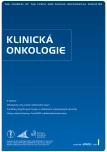Persistence of denosumab in Slovak patients with bone metastases – a prospective observational study
Authors:
M. Porubská 1; A. Němcová 2
Authors‘ workplace:
Onkologický ústav sv. Alžbety, Bratislava, Slovenská republika
1; Amgen Slovakia s. r. o., Bratislava, Slovenská republika
2
Published in:
Klin Onkol 2023; 36(1): 54-64
Category:
Original Articles
doi:
https://doi.org/10.48095/ccko202354
Overview
Background: An integrated analysis of phase III trials in patients with advanced solid tumors demonstrated superiority of denosumab over zoledronic acid in preventing skeletal-related events. A drug’s clinical efficacy, however, depends on regular and continued administration (persistence); persistence in Slovak real-life is yet undetermined for denosumab in the oncology indication. Patients and methods: This was a single-arm, prospective, observational, non-interventional study in patients with bone metastases from solid tumors treated with denosumab every 4 weeks in real-world clinical practice in 5 European countries. The results of the 54 patients from Slovakia are presented here. Persistence was defined as denosumab administration at ≤ 35-day intervals over 24 or 48 weeks, respectively. Results: Previous skeletal-related events were found in 5.6% of patients. 84.8% were persistent over 24 weeks and 61.4 % over 48 weeks. The median (95% confidence interval (CI)) time to non-persistence was 306.5 days (Q1 = 151.0; Q3 = 315.0). The most frequent reason for non-persistence was delayed administration of denosumab. There was a trend towards weaker analgesics over time, with > 70% of patients not requiring any analgesics. Serum calcium remained within the normal range throughout the whole study. Adjudicated osteonecrosis of the jaw was not documented in any Slovak patient. Conclusion: Most patients received denosumab regularly once every 4 weeks over 24 weeks of treatment. Non-persistence was mainly due to delayed administration. The incidence of adverse drug reactions was in line with expectations from previous studies, osteonecrosis of the jaw did not occur in any of the patients involved in the study.
Keywords:
denosumab – bone metastases – persistence – solid tumors – observational study
Sources
1. Weinfurt KP, Li Y, Castel LD et al. The significance of skeletal-related events for the health-related quality of life of patients with metastatic prostate cancer. Ann Oncol 2005; 16 (4): 579–584. doi: 10.1093/annonc/mdi122.
2. Škripeková A. Prevencia skeletálnych komplikácií v protinádorovej liečbe s využitím biologickej liečby. MediNEWS 2014; 1 : 45–46.
3. Špánik S, Špániková B. Súčasné odporúčania na liečbu bisfosfonátmi pri nádorových ochoreniach. Onkológia 2013; 8 (6): 368–373.
4. Križanová K. Využitie biologickej liečby v prevencii bolesti a komplikácií kostných metastáz pri nádorových ochoreniach. Paliat Med Liec Boles 2013; 6 (2): 48–52.
5. Ema.europa.eu. Súhrn charakteristických vlastností lieku. [online]. Dostupné z: https: //www.ema.europa.eu/en/documents/product-information/xgeva-epar-product-information_sk.pdf.
6. Lipton A, Fizazi K, Stopeck AT et al. Superiority of denosumab to zoledronic acid for prevention of skeletal-related events: a combined analysis of 3 pivotal, randomised, phase 3 trials. Eur J Cancer 2012; 48 (16): 3082–3092. doi: 10.1016/j.ejca.2012.08.002.
7. Pereira J, Body JJ, Gunther O et al. Cost of skeletal complications from bone metastases in six European countries. J Med Econ 2016; 19 (6): 611–618. doi: 10.3111/13696998.2016.1150852.
8. Haslbauer F, Petzer A, Safanda M et al. Prospective observational study to evaluate the persistence of treatment with denosumab in patients with bone metastases from solid tumors in routine clinical practice: final analysis. Support Care Cancer 2020; 28 (4): 1855–1865. doi: 10.1007/s00520-019-04988-7.
9. Diel I, Ansorge S, Hohmann D et al. Denosumab and bisphosphonates persistence, compliance and switch in patients with solid tumors (ST) and bone metastases (BM). [online]. Available from: https: //www.valueinhealthjournal.com/article/S1098-3015 (17) 30702-7/ fulltext.
10. Fizazi K, Carducci M, Smith M et al. Denosumab versus zoledronic acid for treatment of bone metastases in men with castration-resistant prostate cancer: a randomised, double-blind study. Lancet 2011; 377 (9768): 813–822. doi: 10.1016/S0140-6736 (10) 62344-6.
11. Henry DH, Costa L, Goldwasser F et al. Randomized, double-blind study of denosumab versus zoledronic acid in the treatment of bone metastases in patients with advanced cancer (excluding breast and prostate cancer) or multiple myeloma. J Clin Oncol 2011; 29 (9): 1125–1132. doi: 10.1200/JCO.2010.31.3304.
12. Stopeck AT, Lipton A, Body JJ et al. Denosumab compared with zoledronic acid for the treatment of bone metastases in patients with advanced breast cancer: a randomized, double-blind study. J Clin Oncol 2010; 28 (35): 5132–5139. doi: 10.1200/JCO.2010.29.7101.
Labels
Paediatric clinical oncology Surgery Clinical oncologyArticle was published in
Clinical Oncology

2023 Issue 1
- Possibilities of Using Metamizole in the Treatment of Acute Primary Headaches
- Metamizole at a Glance and in Practice – Effective Non-Opioid Analgesic for All Ages
- Metamizole vs. Tramadol in Postoperative Analgesia
- Spasmolytic Effect of Metamizole
- Metamizole in perioperative treatment in children under 14 years – results of a questionnaire survey from practice
-
All articles in this issue
- Editorial
- Radiation induced lymphopenia – a possible critical factor in current oncological treatment
- Oncolytic viruses and cancer treatment
- Predictors of cognitive failures in cancer survivors
- Informace z České onkologické společnosti
- Persistence of denosumab in Slovak patients with bone metastases – a prospective observational study
- A unique case of a giant ovarian mucinous cystadenoma causing an acute renal failure and compartment syndrome
- Poděkování recenzentům
- Vzácné choroby provázené hypergamaglobulinemií a zánětlivými projevy
- Hereditární nádorová onemocnění v klinické praxi
- Komplikace onkologických pacientů a možnosti jejich řešení v primární péči
- Snížení rizika užívání tabáku – mýtus, nebo realita?
- prof. RNDr. PhMr. Jan Kovařík, DrSc.
- Predictive biomarkers of response to immunotherapy in triple-negative breast cancer – state of the art and future perspectives
- Building capacity for cancer care infrastructure in Karnataka – the present and the future
- Unique natural history of an EGFR mutated adenocarcinoma
- Clinical Oncology
- Journal archive
- Current issue
- About the journal
Most read in this issue
- Oncolytic viruses and cancer treatment
- Radiation induced lymphopenia – a possible critical factor in current oncological treatment
- Predictive biomarkers of response to immunotherapy in triple-negative breast cancer – state of the art and future perspectives
- Predictors of cognitive failures in cancer survivors
